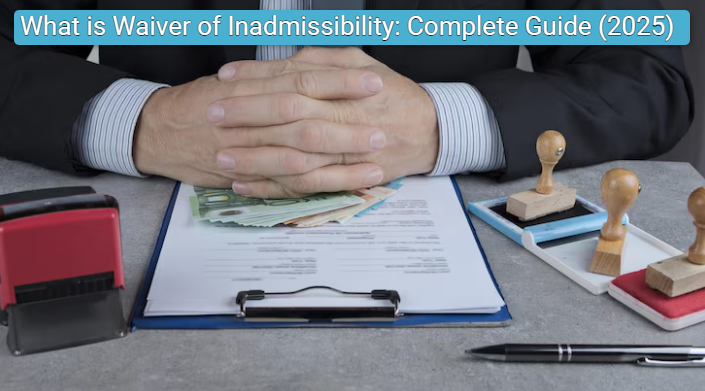What is a Waiver of Inadmissibility: Complete Guide (2025)

Understanding Inadmissibility in US Immigration
Inadmissibility is the legal context in which a foreign national may be excluded from the United States or denied certain benefits of immigration, such as the adjustment of status or the awarding of a green card. These grounds of inadmissibility are established by the Immigration and Nationality Act (INA) and cover things such as: medical issues, crimes, immigration fraud, presence contrary to law, and national security.
Anyone who is inadmissible must take care of these problems before they can continue with their immigration goals. This is where the waiver of inadmissibility is essential — it is a legal way to overcome some barriers to admission.
What Is a Waiver of Inadmissibility?
A waiver of inadmissibility is a legal petition filed with U.S. Citizenship and Immigration Services (USCIS) requesting the agency to waive certain grounds of inadmissibility. Upon approval, the waiver permits the applicant to proceed with their immigration application despite previous problems that would otherwise determine them ineligible.
There are a few types of waivers according to the characteristics of inadmissibility. For instance, a criminal waiver of inadmissibility might be necessary if there are previous convictions for crimes committed by the applicant. Others may be subject to waivers related to immigration fraud and health.
This legal relief is particularly crucial for family-class immigrants, job-based applicants, and those requiring asylum or protection on humanitarian grounds.
Who’s Eligible to Have a Waiver of Inadmissibility?

Not all individuals are eligible to submit a waiver application. Eligibility is based on the grounds of inadmissibility and the type of immigration relief sought.
Among those who may be eligible are:
- Foreign nationals with some criminal convictions (but not for aggravated felonies)
- People with previous unlawful presence
- Applicants who committed visa fraud or misrepresented information
- Individuals considered inadmissible on account of communicable diseases
- Family members who can prove extreme hardship to a qualifying U.S. citizen or lawful permanent resident relative
Who is eligible for a waiver of inadmissibility varies based on several factors such as the category of visa that is being applied for, the family relationship to U.S. citizens, and the severity of the violation.
Types of Waivers: I-601, I-601A, I-212, and More
There are several forms and types of waivers for special circumstances:
- I-601 waiver: Officially known as an Application for Waiver of Grounds of Inadmissibility, it is submitted by individuals abroad after visa denial or by individuals in the U.S. adjusting status.
- I-601A waiver: Also referred to as the Provisional Unlawful Presence Waiver, it permits specific family-based applicants to request a waiver before departing the U.S. for their consular interview.
- Filing I-212 and I-601 together: When an individual is inadmissible and also has a previous removal or deportation, the I-212 (approval to reapply for admission) is filed together with the I-601.
- Form I-602: Applied in humanitarian and asylum situations. For example, by refugees and asylees requesting adjustment.
- Form I-508: Though not a waiver itself, this is sometimes needed by immigrants (including those who work in diplomatic roles) for them to waive their immunity and move forward toward permanent residence.
These need to be submitted appropriately, with complete documentation and evidence of hardship or other legal factors. Failure to understand which form to submit and when can create delays or even denials.
How long is the Waiver of Inadmissibility processing?
Processing time is always a concern for applicants. The waiver I-601 processing time ranges. Currently, typical processing time is 33.5 months, depending on the service center and type of case. Likewise, I-601 waiver processing times vary with immigration trends and staffing shortages.
If you are wondering how long the I-601 process takes, understand that you can view estimated times on the official USCIS website. Consular processing, security checks, and request for additional evidence (RFE) may also add to this timeline.
Approval Rates: What Percentage of I-212 Waivers Are Approved?
When requesting waivers, most are concerned with their chance of approval. According to recent USCIS statistics, the approval rate of I-212 waivers is quite good, between 60% and 70%, when the application is well-documented and contains compelling hardship evidence or legal justification.
While exact percentages can differ year-to-year and by case type, taking legal counsel can greatly enhance your likelihood of approval. When people ask what percentage of I-212 waivers are approved, it tends to reflect a larger issue regarding USCIS discretion — which highlights the importance of an excellent and well-documented application.
Demonstrating Extreme Hardship in a Waiver Application

A cornerstone of most waiver petitions — particularly the I-601 waiver and I-601A waiver — is the capacity to show extreme hardship to a qualifying relative, including a U.S. citizen or lawful permanent resident spouse or parent. This is more than ordinary challenges and must satisfy a higher legal test.
USCIS considers hardship conditions such as:
- Severe medical conditions requiring continued care in the U.S.
- Emotional or psychological distress of separation
- Disruptions to children’s education
- Loss of income or failure to support dependents overseas
- Situation in the foreign national’s home country (e.g., war, violence, limited medical care)
The success of a waiver for grounds of inadmissibility typically depends on strong supporting documentation — affidavits, doctor’s letters, psychological assessments, country condition reports, and financial records.
Steps to File a Waiver of Inadmissibility
Waiver filing is a multi-step process, which depends on the type of waiver:
1. Specify the Proper Form
- For most inadmissibility reasons: submit Form I-601
- For unauthorized presence with a granted I-130: submit an I-601A waiver
- For permission to reapply upon deportation: submit Form I-212
- Refugee/asylee-related reasons: submit Form I-602
- For specific non-citizens subject to diplomatic immunity: send Form I-508
2. Organize Supporting Documentation
Collect:
- Documentation proving the relationship to the qualifying relative
- Proof of extreme hardship
- ID documents
- Past immigration history and supportive legal rationales
3. Submit to USCIS or a U.S. Consulate
- I-601 and I-212 are typically submitted after a visa denial or from outside the country
- I-601 can be submitted either to USCIS for adjustment of status or to a consulate for IV.
- I-601A is submitted in the United States before consular processing
- Pay the applicable fee and monitor the I-601 waiver processing times on the USCIS website
This is an important step — erroneous submission can lead to denial or unwarranted delays.
Using an Immigration Attorney

Filing for a waiver — particularly a criminal waiver of inadmissibility — involves detailed legal expertise, knowledge of USCIS discretion, and compelling documentation. A skilled attorney can assist:
- Determine the proper forms (such as the 1601 waiver)
- Create a legally viable hardship argument
- Prevent procedural mistakes and denials
- Monitor real-time I-601A processing time or other waiver status reports
Professional assistance boosts your odds of success, particularly if you have a complicated case with several grounds of inadmissibility or past immigration infractions.
Need Expert Assistance with Your Waiver of Inadmissibility?
Don’t let previous problems stand in the way of your future! At Passage Law, our qualified immigration lawyers are prepared to assist you in submitting your waiver correctly.
Schedule a consultation today and begin your journey towards approval.
DISCLAIMER: This article offers general legal information, not legal advice. Do not rely upon this information without seeking legal counsel. If you need legal advice, you may contact us directly to speak with an attorney. We disclaim all liability with respect to actions taken based on any information presented. Every case is different and outcomes will vary depending on the unique facts and legal issues of your case
